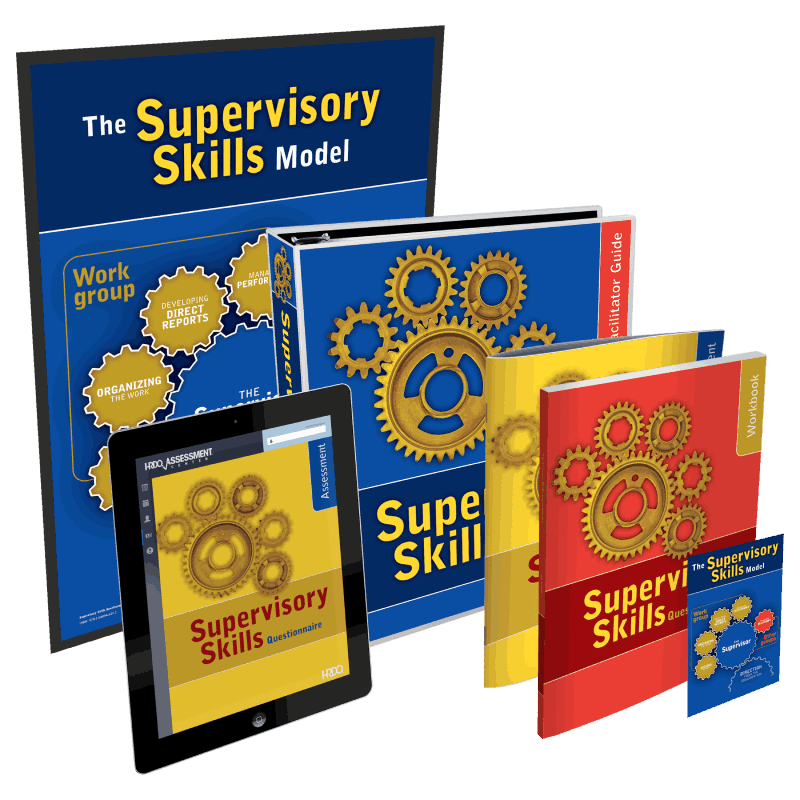Share
Skills for Supervisors: 15 Qualities of a Good Supervisor
Bradford R. GlaserGreat supervisors don’t happen by accident – they’re built through the right mix of skills and mindset. In this post, we’ll break down the 15 leadership qualities that matter most and walk you through the hard and soft skills skills you need to advance the capabilities that help you lead with confidence, clarity, and impact.
Let's get started!

- Improve supervisor skills
- Measure performance
- Discover skill strengths
Table of Contents
- Why Are Supervisor Skills Essential?
- Effective Communication
- Conflict Resolution
- Strong Leadership
- Critical Thinking
- Time Management
- Priority Management
- Diversity Awareness
- Problem Solving
- Guiding Workloads
- Workload Organization
- Staff Development
- Managing Performance
- Interpersonal Skills
- Openness to Advice
- Willingness to Learn
- Advanced Supervisory Skills
- Conclusion
Why Are Supervisor Skills Essential?
These proficiencies are essential because they set the tone for the workplace. If someone is a good supervisor, they can perform their job more efficiently and gain more respect from their peers and subordinates. Learning all the management skills needed to be an effective leader can be challenging, but you should note a few essential items.
A supervisor is anyone who directs and is responsible for the work of others. This person is familiar with their staff's daily work and receives direction from those responsible for decision-making and more significant strategy shifts for the company. Overall, they need to be able to do the following:
- Communicate well with diverse groups in and out of the organization
- Utilize problem-solving skills, creativity, and critical thinking
- Demonstrate qualities like empathy, support, and concern
- Be able to develop their new employees based on their strengths
There are 15 essential skills supervisors need to possess to do their job as successfully as possible.
Effective Communication
Communication skills are one of a good supervisor's most important assets. They need to assign projects clearly and communicate vital information to staff regularly. Transparency is essential, and supervisors should strive to keep an open door for employees to approach them with their needs or issues.
Conflict Resolution
Conflict can happen in a work environment. A good manager recognizes this and creates an effective method of minimizing friction and dealing with it when it takes place. Being a good listener and mediator is also vital in tricky situations.
Strong Leadership
The supervisor should serve as an example to their staff. They must assert leadership and encourage their employees to follow them as they take their organization through regular business changes. A strong leader will encourage their group, improve teamwork, and lead the way to success.
Critical Thinking
There are many tasks that a supervisor needs to deal with that require excellent critical thinking skills. With a high-level position comes more responsibilities and more decisions to be made. Critical thinking skills make the decision process more manageable.
Time Management
Time management is essential in a business with deadlines and deliverables. Being able to juggle timelines and meet goals regularly means supervisors must be aware of when things need to be completed and how much time it takes to do them, plus getting their team to work on the same timeline.
Priority Management
Managers must also be able to structure the workload to ensure all projects are given the correct amount of priority and that high-priority projects are finished first. They must be familiar with all company goals to determine the most critical tasks.
Diversity Awareness
Diversity is crucial in organizations today. A great manager recognizes this and encourages their company to continue working on company diversity and inclusion (D&I). The supervisor may even join the team that works on D&I to help with the initiative more.
Problem Solving
When issues in the workplace arise, supervisors should use their skills to handle them. Excellent problem-solving skills help a manager assess the situation and develop an effective plan to tackle it.
Guiding Workloads
Supervisors need to guide the overall work of their employees. Their view of work must be broader than that of their employees. Being an effective supervisor means understanding and adjusting work to accommodate the bigger picture. They must give direction and carry it out purposefully, plan the workflow, and give active direction to staff members.
Workload Organization
Constantly changing office priorities means that a supervisor must continually organize the work. They must consider the demands placed on the employees when organizing the workload. They should also recognize the employees' needs and listen to feedback when making work and organizational decisions.
Staff Development
A large part of a supervisor's role is developing personnel. Thorough and strategic employee development is essential for happy and satisfied staff, so supervisors should get to know their subordinates' strengths and ambitions so they can help them grow as valuable assets within the company. They should have a plan for the employee's development and set goals for working on their weaknesses and contributing to projects where they are likely to succeed.
Managing Performance
The supervisor is responsible for managing employee performance. They should continually coach direct reports on achieving their potential and set appropriate expectations. Managers should look at future projects, determine how well the employee should perform, and manage them accordingly. Occasionally, there may be performance problems with a team member. In this situation, the supervisor must calmly approach the issue and discuss a plan to overcome it.
Interpersonal Skills
Developing and maintaining good relationships with other departments is also vital. The supervisor wants to ensure their employees and the organization meet their goals, so they should recognize the importance of working together cohesively.
Openness to Advice
Supervisors should look to their peers for advice and guidance when faced with a problem outside their expertise. Issues can be assuaged when a mentor in their organization or field is willing to offer advice when requested.
Willingness to Learn
The last trait supervisors should have is the willingness to learn and grow. While their team is learning, they too should be developing themselves in their careers and trying to learn as much as they can about their subject matter and supervising their employees in the best way possible.
Advanced Supervisory Skills
You have the 15 essential leadership qualities of a good supervisor down, but that doesn't mean you can stop the learning there. Good leadership requires continuously refining your skills and qualities to lead your team more effectively and create a positive working environment.
Emotional Intelligence
Everyone knows about cognitive intelligence (IQ), but what about emotional intelligence (EQ)? Emotional intelligence is the ability to understand yourself and others. It allows you to be aware of your own emotions, understand how to manage them, and know how to handle interpersonal relations. Developing and nurturing your capacity for emotional intelligence by being self-aware and motivated allows you to interact with people on a more personal and meaningful level, leading to greater harmony in the workplace and increased productivity as communication and individual needs are met.
Delegating Tasks
Delegating tasks is good for you and those you work with. One of the keys to being a great leader is delegating tasks to others. It relieves some of your workload, but more importantly, it allows people to expand their skill set and grow in their careers as they try their hand at new things. The critical thing to remember is to make sure that the tasks you delegate to each individual are genuinely meant to help them learn and grow.
Constructive Criticism
Being a good supervisor means you can adequately evaluate the efforts of your employees and provide tips on where they could improve and things that could help them improve. It's crucial to remember that this process is not about tearing the employee down, which can lead to a lack of motivation and engagement. The whole purpose is to build up the employee and unlock their greater potential. Likewise, constructive criticism is a two-way street. It's not always about giving, but it's also about receiving. You may be lacking in certain areas as well, as we all are, and being able to take constructive criticism is equally important and will help you grow into a more successful supervisor.
Adaptability
While most people may not actually like change, being able to meet it head-on and roll with it is a skill that will serve supervisors well. Supervisors are constantly being met with a changing business landscape and the need to improve and build upon performance, relationships, goals, processes, and more. Supervisors who can adapt their methods and confidently lead change attain success for themselves and their teams.
Conclusion
With these essential core competencies and additional advanced competencies, managers can effectively solve any supervisory issues they may encounter and prepare for future situations that require the oversight of a knowledgeable and dedicated supervisor.
Need more help with improving your supervisor skills? With the Supervisory Skills Questionnaire, you'll learn how great supervisors are the vital link between your organization and others you work with. The product is a combination of assessment, employee feedback, workbooks, and a half-day supervisory skills training program that equips supervisors with the skills they need to tackle the everyday challenges they face in the workplace.






















































6 comments
supervising HR staff
Very informative and helpful for grooming leading skills.
These core skills look more like those of a manager than a supervisor. A core skill of a supervisor is ‘delegation’ which I assume you might think is inside time management but, in my opinion, should be a core skill by itself.
Supervisor skills should consider the personality of himself or herself and adjust the work environment in a way fix that person personality. That let go those thinking where the norms is not accepted and improving the personality that will help the company’s achieve the objectives.
very informative